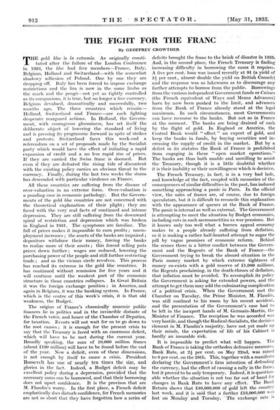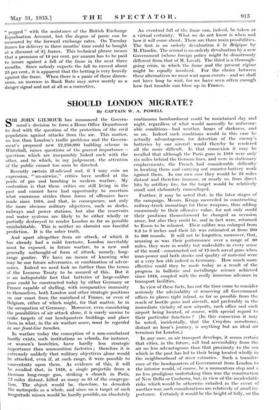THE FIGHT FOR THE FRANC
By GEOFFREY CROWTHER
THE gold bloc is in extremis. As originally consti- tuted after the failure of the London Conference in 1933, the bloc had five members—France, Italy, Belgium, Holland and Switzerland—with the somewhat shadowy adhesion of Poland. One by one they are dropping off. Italy has been forced to impose exchange restrictions and the lira is now in the same limbo as the mark and the pengo—not yet as tightly controlled as its companions, it is true, but no longer a free currency. Belgium devalued, dramatically and successfully, two months ago. The three countries which remain Holland, Switzerland and France—are each fighting desperate rearguard actions. In Holland, the Govern- ment, with courageous gloominess, has set itself the deliberate object Of lowering the standard of living and is pressing its programme forward in spite of strikes and protests. Switzerland faces this week-end a referendum on a set of proposals made by the Socialist party which would have the effect of initiating a rapid expansion of credit and a no less rapid rise of prices. If they are carried the Swiss franc is doomed. But even if they are defeated the rising tide of discontent with the existing policy carries an obvious threat to the currency. Finally, during the last two weeks the storm has descended with particular virulence on France.
All these countries are suffering from the disease of over-valuation in an extreme form. Over-valuation is a puzzling case in economic pathology. But the Govern- ments of the gold bloc countries are not concerned with the theoretical explanation of their plight ; they are faced with the very real facts of continued and intense depression. They are still suffering from the downward spiral of restriction and depression which was broken in England in 1931. The symptoms are familiar. The fall of prices makes it impossible to earn profits ; unem- ployment increases ; the assets of the banks are impaired ; depositors withdraw their money, forcing the banks to realize more of their assets ; this forced selling puts prices down further ; wages are reduced, lowering the purchasing power of the people and still further restricting trade ; and so the vicious circle revolves. This process has reached its extreme in the gold bloc countries. It has continued without remission for five years and it will continue until the weakest part of the economic structure in those countries collapses. In Great Britain it was the foreign exchange position ; in America, and again in Belgium, it was the banking system. In France, which is the centre of this week's crisis, it is that old weakness, the Budget.
The origins of France's chronically anaemic public finances lie in politics and in the invincible distaste of the French voter, and hence of the Chamber of Deputies, for taxation. Events will not wait for us to go down to the root causes ; it is enough for the present crisis to say that the Treasury is faced with an enormous deficit, which will have to be met during the current year. Broadly speaking, the sum of 10,000 million francs (about £130 million) will have to be found before the end of the year. Now a deficit, even of these dimensions, is not enough by itself to cause a crisis. ' President Roosevelt has one of nearly ten times the size, and glories in the fact. Indeed, a Budget deficit may be excellent policy during a depression, provided that the necessary sums can be borrowed, and that their borrowing does not upset confidence. It is the provisos that are M. Flandin's worry. In the first place, a French deficit emphatically does disturb confidence, for French memories are not so short that they have forgotten how a series of deficits brought the franc to the brink of disaster in 19201 And, in the second place, the French Treasury is finding increasing difficulty in borrowing the sums it requires.
A five per cent. loan was issued recently at 91 (a yield of 51 per cent., almost double the yield on British Consols) and the response was so lukewarm as to discourage any further attempts to-borrow from the-public. Borrowings from the various independent Government funds or Caisses (the French equivalent of Ways and Means Advances) have by- now been pushed to the limit, and advances from the Bank of France already stand at the legal maximum. In such circumstances, most Governments can have recourse to the banks. But not so in France at the moment. The banks are being drained of cash by the flight of gold. In England or Ameriea, the Central Bank would. " offset " an export of -gold, and keep the banks in funds, by buying securities and in- creasing the supply of credit in the market. But by a defect in its statutes the Bank of France is prohibited from engaging in these " open market operations?' The banks are thus both unable and unwilling to assist the Treasury, though it is a little doubtful whether it is their inability or their unwillingness which is decisive.
The French Treasury, in fact, is in a very bad hole, and knowledge of the fact, coupled with memories of the consequences of similar difficulties in the past, has induced something approaching a panic in Paris. In the official view, the sales of francs are, of course, due to foreign speculators, but it is difficult to reconcile this explanation with the appearance of queues at the Bank of France. The panic is internal as well as external. The Government is attempting to meet the situation by Budget economies, including cuts in such sacrosanctities as war pensions. But it knows only too well what a barren appeal economy makes to a people already suffering from deflation, so it is making a rather half-hearted attempt to sugar the pill by vague promises of economic reform. Behind the scenes there is a bitter conflict between the Govern- ment and the Regents of the Bank of France—the Government trying to break the absurd situation in the Paris money market by which extreme tightness of money co-exists with a gold reserve of /1,000 millions, the Regents proclaiming, in the death-throes of deflation, that inflation must be avoided. To accomplish its policy the Government is asking for extended powers, and the attempt to get them may add the culminating complication of a political crisis. When the Government met the Chamber on Tuesday, the Prime Minister, M. Flandin, was still confined to his room by his recent accident, and the presentation of the Government's case had to be left in the inexpert hands of M. Germain-Martin, the Minister of Finance. The reception he was accorded was very hostile, and though the Radical-Socialists, the decisive element in M. Flandin's majority, have not yet made up their minds, the expectation of life of his Cabinet is hardly an insurable risk.
It is impossible to predict what will happen. The Bank of France is taking the orthodox defensive measures. Bank Rate, at 21 per cent. on May 22nd, was raised to 6 per cent. on the 28th. This, together with a manifesto declaring the Government's firm intention of defending the currency, had the effect of causing a rally in the'franc, but it proved to be only temporary. Indeed, it is question- able whether the situation is not too far out of hand for changes in Bank Rate to have any effect. The Bank Return shows that £40,000,000 of gold left the country last week, and it is said that a ftuther £13,000,000 was lost on Monday and Tuesday. The exchange rate is " pegged " with the assistance of the British Exchange Equalisation Account, but the degree of panic can be measured by the forward exchange rates. On Tuesday francs for delivery in three months' time could be bought at a discount of 31 francs. This technical phrase means that a premium of 18 per cent. per annum has to be paid to insure against a fall of the franc in the next three months. Since nobody expects the fall to exceed about 25 per cent., it is apparent that the betting is very heavily against the franc. When there is a panic of these dimen- sions, an increase in Bank Rate may serve merely as a danger signal and not at all as a corrective. An eventual fall of the franc can, indeed, be taken as a virtual certainty. What we do not know is when and how it will come about. There are three main possibilities. The first is an orderly devaluation a la Belgique by M. Flandin. The second is an orderly devaluation by a new Government (whose foreign policy might be disastrously different'from that of M. Laval). The third is a thorough- going crisis, in which the franc and the present regime might be equally involved. For the choice between these alternatives we must wait upon events—and we shall not have long to wait, for we have seen often enough how fast trouble can blow up in France.



























































 Previous page
Previous page